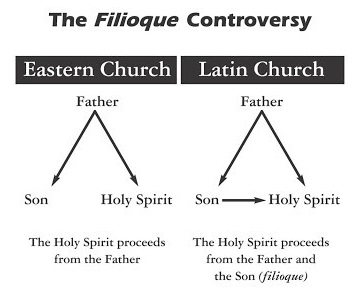Modernity: Difference between revisions
No edit summary |
|||
| (One intermediate revision by the same user not shown) | |||
| Line 15: | Line 15: | ||
[https://orthochristian.com/118769.html Getting to the Essence: A Look at the Schism Throught the Eyes of Professor Osipov] | [https://orthochristian.com/118769.html Getting to the Essence: A Look at the Schism Throught the Eyes of Professor Osipov] | ||
[https://allen-faulton.medium.com/the-modern-survival-guide-introduction-a37f73459250 The Modern Survival Guide Vol. 1: Introduction]<br> | |||
[https://allen-faulton.medium.com/the-modern-survival-guide-vol-2-60422c090fbd The Modern Survival Guide: Vol. 2] | |||
<br> | <br> | ||
<br> | <br> | ||
Latest revision as of 01:31, 15 April 2024
Modernity | Wikipedia [C]losely linked to the ethos of philosophical and aesthetic Modernism; political and intellectual currents that intersect with the Enlightenment; and subsequent developments such as existentialism, modern art, ...also encompasses the social relations associated with the rise of capitalism, and shifts in attitudes associated with secularisation, liberalization, modernization and post-industrial life. Modernism | Wikipedia — See Definition ...a mode of "thinking", "philosophically defined characteristics", "self-consciousness, or self-reference", "novelties" ...a socially progressive trend of thought that affirms the power of human beings to create, improve, and reshape their environment with the aid of practical experimentation, scientific knowledge, or technology. ...a broad cultural, social, or political initiative, sustained by the ethos of "the temporality of the new" ...seeking to restore "a sense of sublime order and purpose to the contemporary world, thereby counteracting the (perceived) erosion of an overarching ‘nomos’, or ‘sacred canopy’, under the fragmenting and secularizing impact of modernity. ...a common cause and psychological matrix in the fight against (perceived) decadence. ...bids to access a “supra-personal experience of reality”, in which individuals believed they could transcend their own mortality, and eventually that they had ceased to be victims of history to become instead its creators.
An Unearthed Treasure That Changed Things
Why Stephen Greenblatt Is Wrong — and Why It Matters
Why Greek?
Getting to the Essence: A Look at the Schism Throught the Eyes of Professor Osipov
The Modern Survival Guide Vol. 1: Introduction
The Modern Survival Guide: Vol. 2
Adam Curtis
See — Adam Curtis -
The Century of the Self
Pandora's Box
Foundation of Modernity
Many may think Modernity began with the Counterculture of the 1960s, especially if right wing Culture war advocates have their influential say. But as said, truth is stranger than fiction. Despite the historical existence of Western “christianity” (Heterodoxy), Eastern Orthodox Christianity (Orthodoxy) is original Traditional Christianity and the true counterculture of human civilization, whereas Heterodoxy (Roman Catholicism and Protestantism) is a distortion of Orthodoxy. Western “christianity” (originating in the Church of Rome in Western Europe) is the creator of Modernity, the secular and secularism. Ironically, it is just such godless secularism that is so despised by modern day, Western “christian”, political conservative, culture warriors — making the claims of such warriors a long departure from the truth, that the source of the secular left in the West is atheist Marxist hatred of their right wing sacred cow of Western “christianity”, “freedom”, “democracy” and “free market” Capitalism.
Fr. John Strickland identifies the point of conversion of the West to Modernity, not in failing church attendance (over which there's much hand wringing in conservative "christian" circles), but in Roman Catholicism's loss of traditional Christian theological foundation, evident in its turn from Orthodox Christian iconography to Western religious painting. The use of realistic, naturalistic style and perspective developed during the Renaissance, especially the manner in which the Christ child is depicted, and also Christian saints and angels make this departure in apostasy apparent.
Infection with the ancient Christian heresy of Gnosticism is also instrumental in conversion of the West to Modernity. Eric Vogelin originally advanced that analysis, which more recently has been summarized within an Orthodox Christian context by Dr. G.M. Davis, who exposes Globalism as a form of Gnosticism and H.G. Wells as originator of many of it tenets.
See —
What Child is This?, or, On the Rise of “Baby Jesus”
On the Diminution of Angels
Oil (Petroleum), Babylon, The Beast
Gnosticism
See — Gnosticism
Filioque
If 'It's Not Nice To Fool Mother Nature!' then it surely isn't nice to fool with The Church's pneumatology, and that's exactly what The Church of Rome did when it unilaterally (without conciliarity with any other Church See, much less ecumenically with them all) added the Filioque to the Nicene Creed. Thereby Roman “Catholicism” was initally created by which Rome arrogated to itself all power and despotic dominance over The Church in the entire world.
(Whether such totalitarianism was “hard” or “soft” or optionally Benedictine matters not.)
In Christian Tradition, the creation of The Church is attributed to the Holy Spirit (3rd Person of the Holy Trinity), so dickering with the Nicene Creed by which The Church had historically defined herself against heresy was effectively an act of apostasy by which Roman Catholicism departed from Church Tradition. Such apostasy is evidenced in 1) the Great Schism, wherein Rome falsely accused the East of heresy, excommunicated the Ecumenical Patriach, and effectively all the other Church sees in the world and their members in communion with the Ecumenical Patriarchy, and 2) the Sack of Constantinople.
Anthropological Pessimism
Roman Catholicism created the secular realm and secularism when its heirarchy sidelined laity to the saeculum (non-sacred secular realm) to wait out experience of communion with God until the afterlife, while exalting the heirarchy, priesthood and monastics to the sacred realm. No wonder, then, that Martin Luther decided to shuck all of those offices when reforming the Church of Rome into the Lutheran Church following his excommunication from Rome during The Reformation, but that's like “burning down the barn to get rid of rats”, or “throwing out the baby with the bath water.” It would have been decidedly better had Luther shucked Roman theological Papal Reformation and returned the west to Eastern Orthodoxy. The Specter of Anthropological Pessimism, also created by Rome, was an “emphatically negative view of the human condition in this world” that stemmed from overemphasis and near sole reliance on theology of Augustine of Hippo, and the novel Satisfaction theory of atonement introduced singularly (individually not conciliarly) by Anselm of Canterbury. Little of this, unfortunately, was reformed by Luther, even though he was at least somewhat aware of Church Tradition in the Eastern Roman Empire (Byzantium), referencing it in his arguments against Rome's apostasy. How different the trajectory of the west might have been if Luther had actually reformed Rome back to her original Orthodoxy.
Repercussions to Natural Environment
After the Church of Rome fooled with the Church's pneumatology, morphed into Roman “Catholicism” with its gnostic tendencies, and created secularism, the West (of Europe) progressively proceeded to endlessly fool around with Mother Nature gnostically as if she were humanity's whore and slave. There is a direct connection between the former and latter, and we only have to look around us today to see what utopian minded effects Modernity such as this hath wroth. Utopia is known in Greek as chiliasm, the human hubris of seeking heaven in the material earth, where it cannot be found by “worshipping the created instead of the Creator.” (“They exchanged the truth about God for a lie, and worshiped and served created things rather than the Creator....” — Romans 1:25) Progress has come to be the religion of the secular Modern West that exists under a thin veil of distorted “christianity”. Progress is worshipped in its incarnation of the Economy, under which is subsumed Science and Technology, and Consumerism. Progress is propagandized with governmental bread and circus performances, and enforced with the greatest and most destructive military might Earth has ever seen, that treads “softly”, at least sometimes, or pretends to do so.
Political Delusion
On the modern political right are those who see too much of Christianity in the West as if the West is a theocratic Old Testament Puritan millenarian, utopian, chiliastic version of the Kingdom of Heaven itself, and on the left are those who see (or would prefer to see) nothing of Christianity in the West at all, even though atheism is a mutation that has never occurred in any human culture in the history of Earth until Modernity. The secular humanistic values of Modernity are but a bastardization of Christian culture exempt of the divine and the sacred, upon whose crumbling ruins Modernity is built. But the alternative does not demand resorting once again to Western “christianity” from whence these problems arose. Orthodox Christianity offers a third way, a return to the true root of Western civilization, as long as it doesn't remain the West's best kept secret.
See — Donald Trump
Patrick J. Deneen
Patrick Deneen Explains Why Liberalism Failed
Patrick J. Deneen - Postliberal Order | Substack
Russia, America, and the Danger of Political Gnosticism
A Party of Commitment
J. S. Mill and the Despotism of Progress
Western Apostasy from Church Tradition
See — Western Apostasy from Church Tradition
Fr. John Strickland
Archpriest John Strickland
Paradise and Utopia | Fr. Strickland's blog
Paradise and Utopia | Fr. Strickland's podcast on Ancient Faith Ministries
Paradise and Utopia: The Rise and Fall of What the West Once Was (Books 1-4)
• The Age of Paradise: Christendom from Pentecost to the First Millennium
• The Age of Division: Christendom from the Great Schism to the Protestant Reformation
• The Age of Utopia: Christendom from the Renaissance to the Russian Revolution
• The Age of Nihilism: Christendom from the Great War to the Culture Wars
In contradistinction to what politicized, presumed “christian” conservatives think they are fighting for in their “culture war”. . . What is Christendom? Christendom is a civilization with a supporting culture that inspires its members to transform the world into a paradise [not a utopia]... For traditional Christianity, paradise is experienced now, in this world, through the transformation of it by the kingdom of heaven. Christendom was built upon this experience and as a result contained a very optimistic cosmology, or vision of the world... It came into existence at Pentecost and functioned as a counter-culture within the pagan Roman Empire for three centuries... ...the optimism of early Christianity began to fade in the medieval west, which came under the influence of pessimistic doctrines and practices about the human condition... The Renaissance was a reaction against this cosmological pessimism, and its humanists more or less reestablished Christendom on a new foundation: Utopia. This new secularized variant of paradise and the transformative power it had over the world flourished all the way until the twentieth century... The Desiccated Soil of Late-Medieval Western Christendom [T]he man that would unintentionally inspire modern Europeans to depart from Christianity altogether, Francesco Petrarca, or Petrarch (d. 1374)... By the late middle ages, western culture had come to be shaped by doctrines emphasizing the miseries of human life and the need for punishment before the kingdom of heaven could be experienced... In a certain way, then, Petrarch’s humanist breakthrough–or breakout–was the result of western Christendom’s ancient desire to experience paradise at a time when that very civilization seemed increasingly to deny it. This was an important reason for the coming of the Renaissance, though historians have conventionally given little attention to it.
The Specter of Anthropological Pessimism
The Pessimistic Cultural Atmosphere of Petrarch’s Christendom
The Birth of Utopia
An Eastern Perspective on the Western Renaissance
The Secular Transformation of Western Art
What Child is This?, or, On the Rise of “Baby Jesus”
On the Diminution of Angels
Reformation and the Forgotten Orthodoxy of the West
Approaching Wittenberg from the East
The Old Christendom Enters a New Millennium
Interviews
Does Church History Matter? | Hank Unplugged Podcast | YouTube Jan 4, 2024
From Utopia to the Age of Nihilism, with Father John Strickland | YouTube Jul 18, 2023
Orthodoxy, Catholicism, and the Cross: My Conversation with Fr. John Strickland | YouTube Mar 12, 2023
From paradise to utopia | YouTube Mar 17, 2022
Paradise and Utopia: An interview with Fr. John Strickland | YouTube Mar 17, 2022
Fr John Strickland on the Eastern Orthodox view of Christian History | YouTube Jan 14, 2022
Seeing the West with Eastern Eyes. The Causes and Enduring Differences of the Great Schism — Part 1 Part 2 | YouTube Jan 11 & 18, 2022
Fr. John Strickland: What is Secular? | YouTube Aug 10, 2021
History of the West in View of the East | YouTube Jan 27, 2021
Reviews
We are Christendom: A Review of The Age of Paradise | Monk Theodore
Not the Best Case | Gary W. Jenkins
John Strickland's rebuttal of Gary ‘Cyril’ Jenkins' criticism —
•
Monographs and Metanarratives: An Answer to Cyril Jenkins, Part I
•
The Forest and Its Trees: An Answer to Cyril Jenkins, Part II







